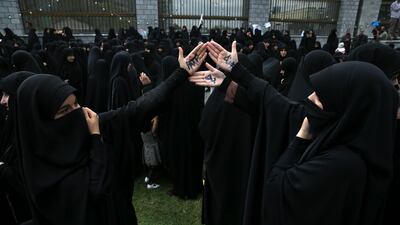An international watchdog on illicit money will decide next week if Iran will go back on a global laundering blacklist, which would increase its financial isolation as its economy is rocked by US sanctions.
The Financial Action Task Force meets in Paris from February 16 to decide if Iran’s efforts to tackle illicit money flow and terrorist financing are enough to stop it being locked out of the international banking system.
The body could clear the way for banks to cut ties with Iran and further strangle funding after the administration of US President Donald Trump reimposed sanctions in November 2018.
International businesses say Iran’s compliance with the rules of the task force, which polices the integrity of the international financial system, are key for securing foreign investment.
The sanctions have limited Iran's oil sales and left the country desperate for funds.
By keeping in line with the watchdog's rules, President Hassan Rouhani hopes the country would be able to secure funds from Asia and Europe, allowing them to bypass US sanction rules.
But Iran's rulers are divided on the issue.
Iran was taken off the blacklist in 2016 when it signed the Barack Obama-era nuclear deal. But it has failed to ratify laws that would bring it into line with the task force’s rules.
Parliament has passed four bills required but two have been held up by powerful, hard-line bodies, the Guardian Council and the Expediency Council, despite initial approval by legislators.
Mr Rouhani’s opponents say that passing the laws could hamper Iran’s support for its allies including Hezbollah.
"Our national interests should not be ignored and we should not let Trump and those terrorists in the White House cut Iran's relationship with international banks,” Mr Rouhani said in a speech last month.
In October the task force, established in 1989, gave Iran until February to comply with its rules after which it would urge its 39 members to apply counter-measures.
It said that unless Iran addressed problems in its financial system, it would “remain concerned with the financing risk emanating from Iran and the threat this poses to the international financial system”.
Tom Keatinge, head of the centre for financial crime at think tank RUSI in London, said that the case for returning Iran to the blacklist seemed clear.
But Mr Keatinge said that returning Iran to the blacklist would undermine officials who supported the legislation that could bring it into line with the rules.
“From a political perspective, offering Iran a further stay of execution would perhaps be wise,” he wrote in a commentary.

